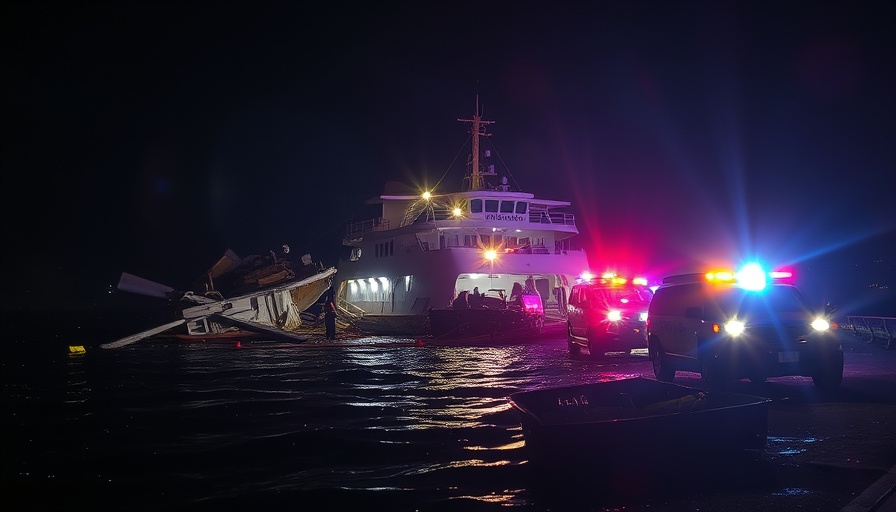
A Tragic Collision: Overview of the Incident
The serene waters of Clearwater turned chaotic when a private boat crashed into the Clearwater Ferry, leading to tragedy. The collision occurred as the ferry was returning from the Sugar Sand Festival, loaded with 45 passengers. The boat, piloted by Jeff Knight, was reported to have struck the ferry at high speed, resulting in the death of one amid numerous injuries.
Emergency responders found chaos; screams echoed, and witnesses described scenes of panic and confusion. Jose Castro, a 41-year-old passenger, sadly lost his life in this harrowing event, while at least ten others sustained injuries that required urgent medical attention, some needing airlifts to trauma centers.
The Aftermath: Casualties and Community Response
As news spread of the incident, community members expressed their shock and sorrow. The aftermath was not just about the physical injuries—many passengers, including those who were pregnant, faced both physical and psychological impacts. Brenda Alvarez, a 31-week pregnant passenger, described the harrowing experience of being thrown from her seat, emphasizing the terrifying nature of the crash. The Clearwater Police Chief Eric Gandy characterized the emergency as a ‘major situation’ and noted the horrific screams heard during the urgent calls for help.
Understanding the Causes: Implications for Boating Safety
What exacerbates the situation is the fact that Knight was reportedly sober during the crash, passing sobriety tests after fleeing the scene. This revelation raises crucial questions about boating safety regulations and the inherent dangers of speeding on waterways. Boating accidents can happen at any time; heightened awareness of safety protocols is essential, particularly in popular areas with active waterways.
In the wake of this incident, discussions about boating laws in Florida have reignited. Advocates voice the need for more stringent safety measures to protect passengers and boaters alike. Boating while distracted or excessively speeding poses a significant risk, and there is a growing call for improved training for those operating boats, focusing not only on skills but also on the responsibilities that come with piloting a fast-moving vessel.
Legal Ramifications: What Lies Ahead for Jeff Knight
As investigations continue, Jeff Knight faces potential legal consequences, including charges related to fleeing the scene of a crash. The legal processes following such incidents typically unfold in stages, often involving extensive hearings in which evidence is presented and arguments exchanged. Families affected by the tragedy may pursue civil actions to seek restitution for their losses, further complicating the situation.
Knight's future now hangs in the balance, and during a time of grief for families affected, it’s also a compelling reminder of the importance of accountability on the waterways.
The Broader Implications: Community and Safety Measures
This tragic event has prompted discussions within Clearwater and beyond about the enforcement of boating regulations. In light of this incident, authorities will likely examine current laws to determine if enhancements are necessary to ensure public safety. The role of local authorities is critical as they embark on efforts to educate boaters on the importance of maintaining low speeds, especially in crowded maritime environments.
Moreover, the emotional toll on survivors and community members underscores the need for support systems in place to aid those affected, particularly during public festivals that draw large crowds to the water.
Reflection and Moving Forward: A Call for Change
In conclusion, the Clearwater ferry incident serves as a crucial wake-up call regarding the necessity of improved safety measures on waterways. It is vital that we learn from tragedies like these to prevent future occurrences. Both the legal and emotional aftermath of such accidents can ripple through communities for years to come.
The public must remain vigilant, advocating for better safety regulations and ensuring that boating activities are guided by principles of responsibility and care. As the investigation unfolds, it is a time for reflection, unity, and action. Local communities must rally not only for those who lost their lives but also to foster an environment where such tragedies can be prevented in the future.
 Add Row
Add Row  Add
Add 



Write A Comment